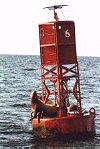 REUTERS NEWS SERVICE
REUTERS NEWS SERVICE
September 22, 1999
LONDON - Oil tankers get a bad press but shipping
causes only a small amount of marine pollution,
maritime experts said yesterday at a London
conference.
"Shipping is less polluting than most other transport
modes. It is responsible for only some 12 percent of marine
pollution," Mats Lindau, quality manager of marine insurer
the Swedish Club said.
"Land sources from polluted rivers account for the lion's
share," he said at the Clean Seas conference, but public
perceptions remained negative towards shipping.
Tim Wilkins, a marine biologist at tanker owners
organisation Intertanko, said 62 percent of oil pollution at
sea came from industrial waste.
Some three percent resulted from tanker accidents while
another seven percent arose from loading and other
operations.
According to U.S. CoastGuard figures engine oil spills and
oil waste discharges from other vessels massively
outstripped cargo losses from tankers, Wilkins said.
It was the operational losses that tanker owners were
seeking to reduce through better application of current
marine pollution rules, he said.
One of the main ways of reducing them would be through
better provision of reception facilities at ports for oil wastes
and ballast water, Wilkins said.
International regulations call for ports to provide facilities,
but shipping sources say they are still lacking.
Pointing to chemical waste as a major problem, Roger
Lankester of Friends of the Earth, said there were only two
oil/chemical reception sites in Britain.
Wilkins said tanker owners had largely accepted their
liabilities but that pressure needed to be put on port
operators through governments and the International
Maritime Organisation to ensure they fulfilled their
responsibilities.
Lindau said the industry could also do more by increasingly
adopting environmental management codes, such as
certification under international standard ISO14001.
"Many charterers, particularly the oil and chemicals majors,
can be expected to pay increasing attention to ISO14001 in
the years ahead," he said.
Critics had pointed out that the international standard did
not actually require progressive improvements in
environmental performance, only in the management of
standards.
But Lindau said that process would lead to direct
improvements for the environment.
Lankester also called for greater attention to be paid to ship
designs to reduce waste pollution problems, and for charter
clauses allowing ships' masters more power to take
account of adverse conditions.
"There is a need to look at charter parties to allow sufficient
leeway for captains to run ships safely," he said.
Related Links
Planetark-- Tankers' bad press on oil spills said undeserved - UK
US Coast Guard-- The United States Coast Guard Website
-- Intertanko Cargo
International Maritime-- International Maritime Organization's Homepage
|

